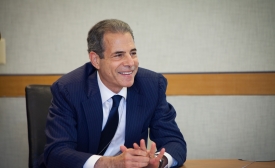richard stengel

This week in Public Diplomacy, digital diplomacy shaped the global dialogue and altered the way nations interact.
On the same day the United States announced the arrest of a 19-year old attempting to leave the country to join ISIS, a top State Department official said the American efforts to combat ISIS' powerful online message are working.
Richard Stengel has a bleak vision of the world's future - so bleak, in fact, he compared it to Westeros. During Monday's Social Good Summit, the under secretary for public diplomacy and public affairs provided a dystopian outlook for 2030 - in contrast to the optimistic visions several other panelists presented - in hopes of mobilizing today's youth to get more involved and start preparing for the future as soon as possible.
Without question, the Obama administration has been slow in coming up with a strategy to counter the threat from ISIS terrorism. This week, Rick Stengel, Undersecretary of State for Public Diplomacy, made the case for soft power. He told a packed audience at the American Security Project his office faces challenges as momentous, but far more complex, than any the United States has seen since the fall of Soviet communism.
The Barack Obama administration is focusing its public diplomacy efforts on persuading “swing voters” in the Muslim world that the group calling itself the Islamic State (IS) is a bigger threat to them than US policies, the State Department’s top communications official says.

CPD welcomed U.S. Under Secretary of State for Public Diplomacy and Public Affairs Richard Stengel for a special event on October 15.
I had to laugh when I heard about the U.S. Agency for International Development’s botched effort to create a Twitter-like platform for Cuba intended to undermine the communist regime. Even the name — ZunZuneo — to the State Department’s credit, sounded like something cooked up in Silicon Valley, not Foggy Bottom.
Moscow is subjecting Ukrainians, Russians and the rest of the world to an intense campaign of disinformation that tries to paint a dangerous and false picture of Ukraine’s legitimate government. Russia Today, the Moscow-based TV network financed by the government, is a key player in this campaign of distortion. Along with its Russian operation, RT operates an English-language broadcast out of Washington.







